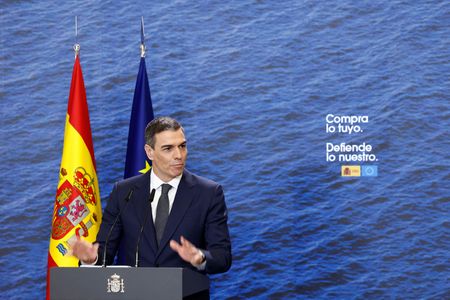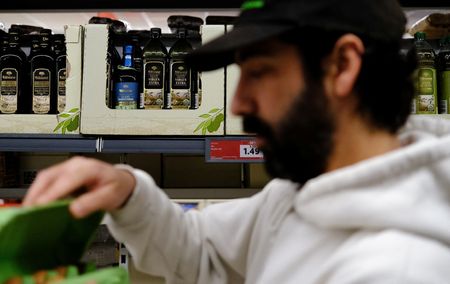By David Latona and Corina Pons
MADRID (Reuters) -Spain on Thursday was one of the few major economies to offer up a concrete solution to help weather the impact of new U.S. tariffs, offering its companies a financial package of loans and direct aid worth 14.1 billion euros ($15.66 billion).
The tariffs announced by U.S. President Donald Trump on Wednesday have rattled markets and drew condemnation from world leaders facing an abrupt end of an era of trade liberalisation that has shaped the global order for decades.
Spain, which like other European Union members was hit by U.S. tariffs of 20% imposed on imports from the bloc, is the world’s top exporter of olive oil and sells important quantities of auto parts, steel and chemicals to the United States.
Sanchez described Trump’s actions as “terrible news for the world”, “unintelligent” and “a return to 19th-century protectionism”. “This tariff attack by the U.S. administration makes no distinction between friends and enemies, it doesn’t discriminate based on ideology or trade balance; it’s against everyone and everything,” he said. Sanchez also stressed Europe’s need to find new trading partners elsewhere. He is set to visit Vietnam and China next month, attempting to forge closer economic ties with the Asian countries. DIRECT AID AND SOFT LOANS Spain’s aid package – which still needs to be approved by a fragmented parliament – will include 7.4 billion euros in new financing, and the rest will come from existing instruments such as soft loans, Sanchez said. He said that 5 billion euros of EU recovery funds would be repurposed to help industries hurt by the tariff shock – such as auto suppliers – reorient their productive capabilities towards other high-demand sectors. The government will also contribute with 2 billion euros’ worth of credit insurance and export risk coverage.
Rafael Pico, head of the Spanish Association of Olive Oil Exporters Asoliva, welcomed the measures and said the aid would help the industry invest in improving production processes and finding new markets.
But he also called on the government to negotiate a reduction in the 20% tariff to align with competitors from other countries that were handed a lower rate.
Spain exports 180,000 tonnes of olive oil directly to the U.S. while another 180,000 tonnes are sold to Germany, Italy, Belgium and Britain before being packaged for export to the U.S., Pico said.
“We’ll see how effective (the measures) are, but they don’t solve the problem of tariffs in a market that is irreplaceable for us,” he said.
The aid package from the Spanish government will serve as a stop-gap so that the most exposed companies are not forced to shut down but it will not offset the loss of U.S. market share, said Antonio Gonzalez, an economist at the Economists Against the Crisis think tank.
“Trump’s tariffs are so brutal that it’s very hard to see how they’ll be compensated through soft loans or subsidies,” Gonzalez said. Sanchez urged the European Commission to set up a fund financed by revenues from tariffs on imports from the U.S. that are set to be hiked this month in response to Washington’s move that he said was unfriendly and unjustified. Spain has sought EU authorisation to allow more flexibility for large-scale domestic aid for the affected sectors. Sanchez said he would use a labour law provision similar to a furlough scheme implemented during the COVID-19 pandemic to allow the hardest-hit companies to maintain their workforce until they recover. “We’ll take advantage of this trade war to give our industry a new impulse for its modernisation and internationalisation,” Sanchez said. ($1 = 0.9006 euros)
(Additional reporting by Inti Landauro, Jesus Aguado and Emma Pinedo; writing by Charlie Devereux; editing by Andrei Khalip, Tomasz Janowski and Ed Osmond)












